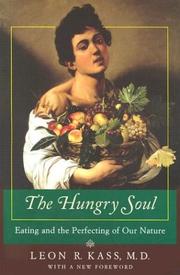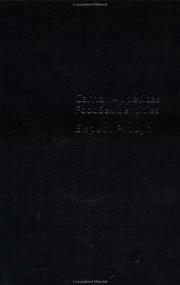| Listing 1 - 10 of 20 | << page >> |
Sort by
|
Book
ISBN: 2742746439 Year: 2004 Publisher: Arles : Actes sud,
Abstract | Keywords | Export | Availability | Bookmark
 Loading...
Loading...Choose an application
- Reference Manager
- EndNote
- RefWorks (Direct export to RefWorks)

ISBN: 0226425681 Year: 1999 Publisher: Chicago University of Chicago Press
Abstract | Keywords | Export | Availability | Bookmark
 Loading...
Loading...Choose an application
- Reference Manager
- EndNote
- RefWorks (Direct export to RefWorks)
Eating (Philosophy). --- Eating (Philosophy) --- Dinners and dining --- Philosophy
Book
Publisher: Bruxelles : Em. Rossel & fils,
Abstract | Keywords | Export | Availability | Bookmark
 Loading...
Loading...Choose an application
- Reference Manager
- EndNote
- RefWorks (Direct export to RefWorks)
Eating (Philosophy) --- Food habits --- Dietetics
Book
Abstract | Keywords | Export | Availability | Bookmark
 Loading...
Loading...Choose an application
- Reference Manager
- EndNote
- RefWorks (Direct export to RefWorks)
Image (Philosophy) --- Eating (Philosophy) --- Food --- Food
Book
ISBN: 0748605967 Year: 1995 Publisher: Edinburgh : Edinburgh university press,
Abstract | Keywords | Export | Availability | Bookmark
 Loading...
Loading...Choose an application
- Reference Manager
- EndNote
- RefWorks (Direct export to RefWorks)
Dinners and dining. --- Eating (Philosophy) --- Food habits. --- Food --- Social aspects. --- Eating (Philosophy).
Book
ISBN: 9781478011415 9781478010371 Year: 2021 Publisher: Durham : Duke University Press,
Abstract | Keywords | Export | Availability | Bookmark
 Loading...
Loading...Choose an application
- Reference Manager
- EndNote
- RefWorks (Direct export to RefWorks)
"Eating in Theory draws on snapshots of eating practices to shift a range of fundamental intellectual reflexes. The terms that shape current social science and humanities theorizing are marked by a hierarchical version of "the human" in which thinking is celebrated and eating is demoted to a mundane necessity. However much sense this may have made in the past, it works poorly in a time of ecological crisis. Drawing on ethnographic research into eating practices in the Netherlands, Eating in Theory re-thinks the core theory terms being, knowing, doing and relating. These are no longer external, distant, centered and companionable, but entangled, transformative, spread out and suspended between fostering and devouring"
Eating (Philosophy) --- Food --- Food habits --- Environmental aspects. --- Psychological aspects. --- Eating (Philosophy).
Book
ISBN: 1478012927 Year: 2021 Publisher: Durham, North Carolina ; London, England : Duke University Press,
Abstract | Keywords | Export | Availability | Bookmark
 Loading...
Loading...Choose an application
- Reference Manager
- EndNote
- RefWorks (Direct export to RefWorks)
"Annmarie Mol reassess notions of human being and becoming by thinking through the activity of eating, showing how eating is a lively practice bound up with our identities, actions, politics, and senses of belonging in the world."--
Eating (Philosophy) --- Food --- Food habits --- Environmental aspects. --- Psychological aspects.
Book
ISBN: 9781478030867 9781478026624 Year: 2024 Publisher: Durham Duke University Press
Abstract | Keywords | Export | Availability | Bookmark
 Loading...
Loading...Choose an application
- Reference Manager
- EndNote
- RefWorks (Direct export to RefWorks)
"In Eating is an English Word Annemarie Mol works in collaboration with other scholars to build off of previous work focused on eating's application in theory to think more linguistically about eating as a theme in the English language. Considering the idiosyncratic connotations of eating as an English word, the contributors to this collection push back against the universality of language. By examining non-English equivalents of the word from languages such as Dutch, Portuguese, German, and Spanish, the book's chapters contemplate eating's verbal and physical meanings, as well as the pleasures that accompany it. Moreover, in using eating as an example of analytical difference, Eating is an English Word explores the capabilities of language within research fields and practices. Eating thus becomes a vehicle for reorienting the act of valuing towards appreciation instead of judgment, creating a deeper form of engagement for academic conversations"--
Anthropological linguistics --- Eating (Philosophy) --- English language --- Philosophical anthropology

ISBN: 0415223040 0415223059 Year: 2000 Publisher: London : Routledge,
Abstract | Keywords | Export | Availability | Bookmark
 Loading...
Loading...Choose an application
- Reference Manager
- EndNote
- RefWorks (Direct export to RefWorks)

ISBN: 0203377923 1134595530 1280022302 0203361164 9780203361160 9786610022304 6610022305 9780415223041 0415223040 9780415223058 0415223059 0415223040 0415223059 9780203377925 9781134595532 9781280022302 9781134595488 9781134595525 1134595522 Year: 2000 Publisher: London New York Routledge
Abstract | Keywords | Export | Availability | Bookmark
 Loading...
Loading...Choose an application
- Reference Manager
- EndNote
- RefWorks (Direct export to RefWorks)
In Carnal Appetites, Elspeth Probyn charts the explosion of interest in food - from the cults that spring up around celebrity chefs, to our love/hate relationship with fast food, our fetishization of food and sex, and the impact of our modes of consumption on our identities. 'You are what you eat' the saying goes, but is the tenet truer than ever? As the range of food options proliferates in the West, our food choices become inextricably linked with our lives and lifestyles. Probyn also tackles issues that trouble society, asking questions about the nature of appetite, desire, greed a
Eating (Philosophy) --- Identity (Philosophical concept) --- Identity --- Philosophy --- Comparison (Philosophy) --- Resemblance (Philosophy) --- Dinners and dining
| Listing 1 - 10 of 20 | << page >> |
Sort by
|

 Search
Search Feedback
Feedback About UniCat
About UniCat  Help
Help News
News